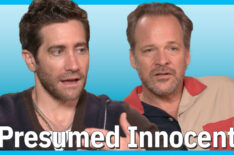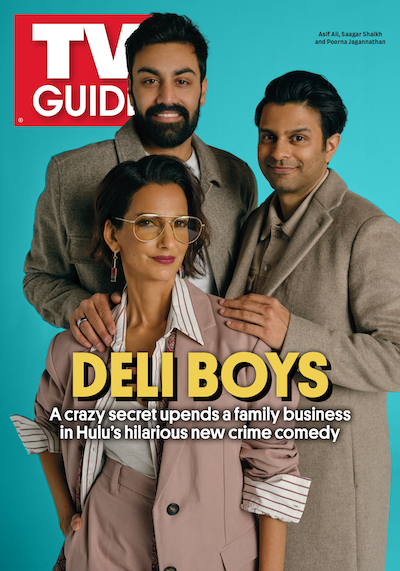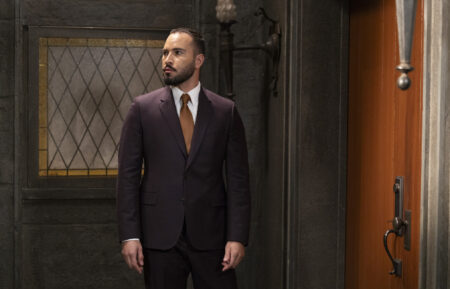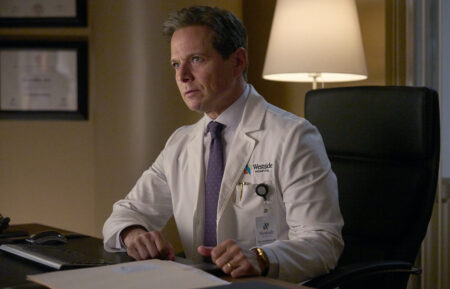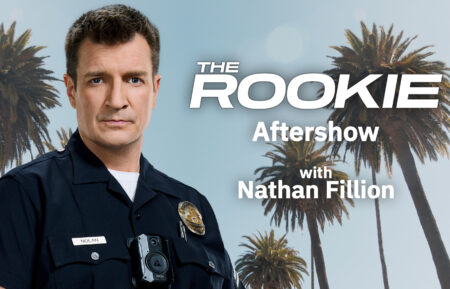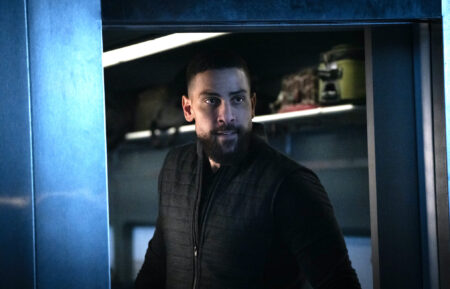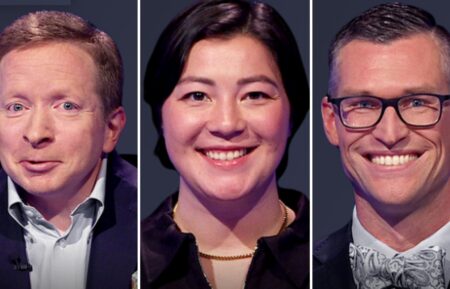‘Presumed Innocent’ Director Breaks Down That Courtroom Confrontation, Teases ‘Satisfying’ Season Finale
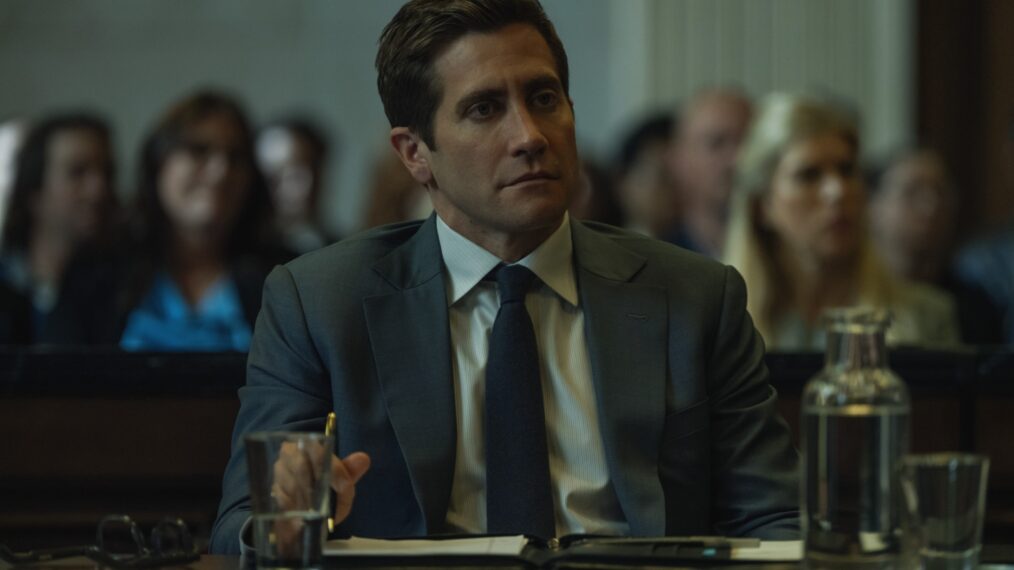
[Warning: The following post contains MAJOR spoilers about Presumed Innocent Episode 7, “The Witness.”]
Welp. We’re just one episode away from the Season 1 finale of Presumed Innocent, and we still don’t quite know who killed Carolyn Polhemus (Renate Reinsve), but Rusty Sabich (Jake Gyllenhaal) is looking guiltier by the second.
In Friday’s new episode of the crime thriller series, Rusty has the very terrible idea to continue as his own lead attorney after Raymond’s (Bill Camp) heart attack, despite Judge Lyttle’s (Noma Dumezweni) offer of a no-questions-asked mistrial. As Mya (Gabby Beans) predicts, it’s a massive mistake that lands him right in hot water.
After cross-examining Carolyn’s son, Michael (Tate Birchmore), and successfully raising the possibility of another killer, he then completely botches his defense by asking Det. Alana Rodriguez (Nana Mensah) questions that form a new narrative and thus force Rusty to take the stand. There, he is thoroughly dissected by Tommy Molto (Peter Sarsgaard), who exposes not only Rusty’s obsessive texting spree but also his violent outbursts, to prove that he can indeed “snap.”
In return for his troubles, Molto receives a seemingly threatening message in his home: a fire poker — just like the weapon that killed Carolyn — with a note attached reading, “Go f*** yourself.”
Ahead of the finale, TV Insider caught up with episode director Greg Yaitanes (who also serves as executive producer and directed Episodes 3, 4, 5, and 6) to dissect this nail-biter of a bottle episode and get a sense of what’s ahead in the season’s last bow.
What were some of the ways you wanted to differentiate the show from the book and the prior film?
Greg Yaitanes: I had worked with Bad Robot a number of times — and Dustin [Thomason], Rachel [Rusch Rich], and J.J. [Abrams] — most recently on Castle Rock. So I was walking back into an environment, both in front of and behind the camera… of people I’d worked with before. So it was a very natural start. And I think when you have that shorthand, you can immediately dive into what you’re doing… You sort of begin the [conversation of], “What does this thing feel like and look like?”
Anne [Sewitsky] and I had a lot of conversations around that. Along the way, I had stylistic and cinematic touchstone references to pursue because I felt there would be a good diet of things we should look at and then see how we put our own spin on it along the way — looking at the film, reading the book, seeing the difference between those two things and how we want to unfold and pay attention to things. But I think both things were great mediums. And equally, changing characters or conflating characters presented its own challenges.
So there were all these kinds of moving parts, but along the way, in terms of the textual elements, I was looking at JFK — there’s an extensive courtroom scene in that, and there’s the use of going out of the courtroom for flashback. Bob Fosse remains a huge influence on the kind of nonlinear editing … and the things that he did influenced my work by Banshee… It was looking at great courtroom sequences and films, like The Other Verdict with Orson Welles. Those were things where the actors were so strong, the power of trusting the actor and not having to edit around them and then using editing to its greatest effect.
All those things were kind of in consideration when we were trying to figure out what we were doing and how to approach it. But I think for me, I got into the business wanting to make ’90s thrillers. When I see that a theater has a Pacific Heights and Single White Female double feature [I’ll go]. Those are the things that I wanted to be doing when I was first coming into the business in the ’90s, and to make something that I felt was really getting to finally flex that thriller muscle that I’ve been wanting to do for so many years and do it here with the top level talent I was around was awesome.
Your episodes have a fever dream quality to them at some point — sometimes it’s an actual dream, but other times, it’s just the imagination or the tension that sets that mood. Can you talk about building that narrative voice?
If you look at most of my work, the themes of family [loom large]. I did second and third Dune novels for Sci-Fi Channel 20 years ago. That was the story of a big dysfunctional family. I come from a big dysfunctional Greek family, so I love the mess of all that and love the exploration of that. Finding my parents, grandparents, uncles, aunts, me in the stories — as did I, you know, with House of the Dragon… Viserys was a single dad to a daughter, which is what I was, I just remarried. So I understood that character. And I understand, I’m interested in men in their middle age under the pressure cooker and what that would feel like. I feel like when those things have happened, and the bottom’s going out under your life and pulling from things I’ve seen and things I’ve experienced like that was the intangible texture that I really wanted to bring to those episodes. Every day I’m like, ‘How would I react in this situation? How would you be when you don’t like things that are coming at you, you can’t control the narrative anymore, and things are falling apart around you? And what does that do to a family?’
We shot inside of locations in sequence. In the Sabich house, the three weeks I was shooting in the Sabich house were a pressure cooker. I also know that things are working because every day, I was more and more emotionally exhausted when I got home because we were just — the power of those scenes and what they were about, and what was coming up, and what Ruth and Jake and Chase [Infiniti] and Kingston [Rumi Southwick] were bringing to it was like just flooring me every day and imagining what this would be like for my family.
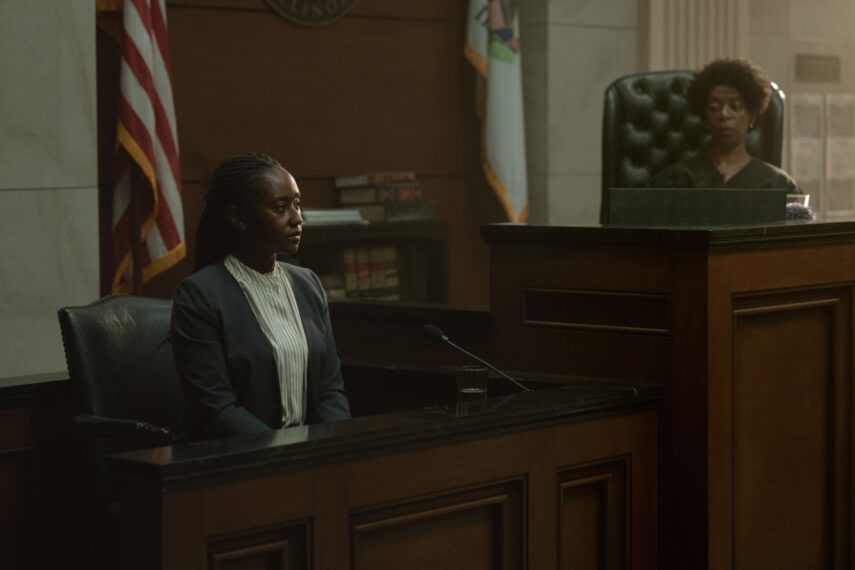
Apple TV+
Can you talk about creating all of those jaw-dropping cliffhangers?
I’m a big fan of week-to-week [show structure] in terms of keeping that conversation going. I feel like everybody’s having the conversation the same way at the same time. So whether it was House of the Dragon Season 1 or Presumed Innocent or back when I was doing House, everybody was in the same conversation about this thing that was clearly reaching a lot of people and being meaningful to a lot of people.
David constructed the scripts for us to pick up where we left off [each episode]… Interestingly, those were not as challenging as how you open the episode. You’re presumably at [level] 100 when you’ve ended an episode of Presumed Innocent. To start and kind of recalibrate everybody into the beginning of the next episode, and then reach that again, but not dropping down all the way the tension is a high-wire act. So actually, opening the episodes was more challenging than ending them, but I like that they are usually emotional gut punches.
It pulls you in. Truth is stranger than fiction. And I have no doubt that what always sort of rang true to me is that these are the things that could be happening and unfolding as you’re boiled in something that you don’t necessarily fully know what’s coming next… I find Barbara, Ruth Negga’s character, and how she navigates one revelation after another in those early episodes, fascinating. It’s everything that leads up to creating a space where everybody’s doing that work in a particular sequence to achieve those endings, it’s pretty phenomenal work in partnership.
In Episode 7, when Rusty’s having a conversation with Eugenia (Virginia Kull) in the car, this ugly side of him comes out. What kind of direction did you give Jake Gyllenhaal to find that complexity of the character?
That was interesting. There are some accidents that came out of the fact that the strike happened. We were back lot at Warner Studio, and that scene was written for somewhere else. It became in the car, we added range walls, it’s that kind of movie magic scene that really, again, set them in that real pressure cooker of a space.
I tend to direct by just kind of bumping the sides and sort of planting an idea, and then we [go]. Actually, that one take, we just put both cameras and shot the scene that way and just let them go and go and go and go and just to see what they would discover. And Jake will always come out. It’s why he auditions every single person that’s going to happen because he wants to see how they will pivot with him and be able to play. And Virginia was just phenomenal…
They’ll come off from a completely different place, and that will take you to a completely different area. So, but I think what we really landed on was that demand and that feeling that he’s still in control, trying to control the situation, let’s know what’s going to be said. [Episode] 7 is really one of my favorites because of the thought you got Rusty having a business which is totally bonkers. And I love it, and I love what Jake is like, and you feel that Jake is completely Rusty. He is composite the whole time trying to demand that everybody out to him. So there’s a lot of narcissism in there, but there’s also desperation and trying to control his life.
When he’s in the courtroom, there’s a frenetic pace. What was your prerogative on pacing with those scenes?
The thing about that episode was, I wanted it to be mayhem. We decided to have a different look than the other episodes, especially with a lot of our nervous camera — it wanted to be off-kilter and unsettling… A meaningful static shot is when he’s in the bathroom before Molto walks in because I just wanted completely crazy. It’s like, within 24 hours, this is happening in the hospital, representing himself, he’s gonna take the stand, boom, boom, boom, boom, boom, and then we’re in with him when he’s hearing himself before.
I read it as reflecting him taking the Ritalin and changing the pace of his own thoughts.
You know, it’s funny. Yes, I think that that was something that was bringing — I mean, I always feel like those kinds of things enhance whatever your mood is. It just puts an exclamation mark on it, so I think that everything is just notched up a little bit more in Episode 7. And for sure, that’s why we introduced those things. And it’s not uncommon for people to take those things to give them the edge or be able to concentrate or to do whatever they’re doing. It’s just I think it’s alarming because we see things through Barbara’s eyes. And I like that she comes in and isn’t shaming him. It’s like, “These again? We’re doing this? We’re not talking about this?” I was trying to get out that there was some problem with them. But I feel like the idea was that he was kind of kicked up a notch, and that was also adding to wondering if the decisions were getting away from him. And I think that throwing drugs into the mix is never a good sign. The second you see the coke bowl come out in any TV or movie? You know it’s all downhill.
In the ending of this episode, Tommy finds a fire poker with a threatening message. What can you tease about that?
I didn’t direct the finale, but I produced the finale. So I mean, I think that was one of the real pleasures I had here was I traditionally come in and do the openings and closings of things, but I liked having to really do what I found to be the real thriller element of the story is. The open is doing all the heavy lifting in the middle and keeping it engaged every week. I think it was like I was making the show I’d want to watch, every single day we were in it.
I think that ending, as the episodes go, it’s not unreasonable to expect we’re going to pick up shortly [from] where we left off, with what that means and what it does to the case and who’s behind it. It’s all part of what we’re hurling towards in the finale. But I feel like it’s an incredibly satisfying finale. And I’m hard to please on those kinds of episodes. I’m usually a pretty harsh critic of those, and I think we’re all pretty proud of it.
The show was just renewed. You said it’s a satisfying finale, so what’s your hope for Season 2?
It’s so early. I don’t know much there… But I do feel like it’s a real win when somebody wants more of something. And I feel like this team would only come back together if we felt we could deliver another entertaining season of the show for everybody.
A couple of people wrote me wondering if this is not going to get resolved this season, and this case is going to get fully resolved and fully satisfied. What’s next season, who’s in it, and where it is and what it’s about is all being determined.
Presumed Innocent, Wednesdays, Apple TV+
From TV Guide Magazine
Crime, Comedy & Convenience Stores: Unwrapping Hulu's 'Deli Boys' With the Cast
Cupcakes, corndogs…and cocaine?! Two brothers find themselves in a hilarious pickle when they inherit an unseemly bodega biz in Hulu’s new comedy Deli Boys. Find out how The Sopranos and Real Housewives of Orange County influenced the cast. Read the story now on TV Insider.

